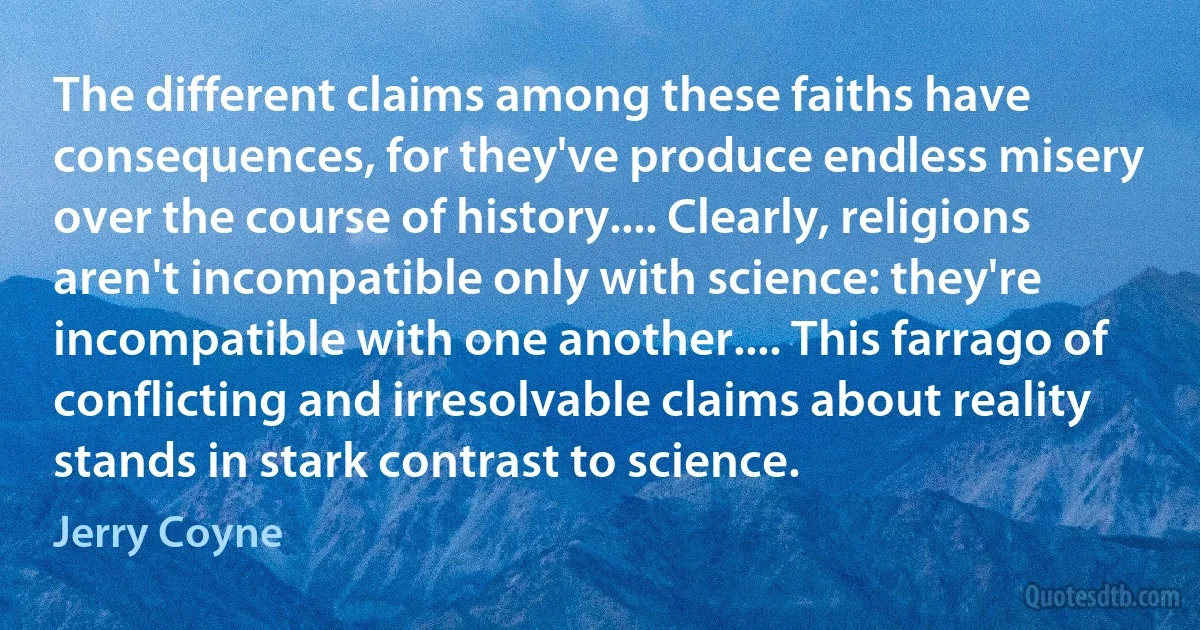Consequences Quotes - page 19
Your Excellency's favor of the 22d was delivered to me this afternoon. I am happy to find you have wrote so fully to Congress, upon the disagreeable consequences that may follow from starving the Quarter master's department at this critical season. I wish it may have the desired effect, and rouse their attention; but I must confess I am afraid the stupor is so great, that nothing can alarm their fears, or pro mote a spirit of industry.

Nathanael Greene
It would be a folly for me to attempt to change the general disposition of mankind, or to flatter my self with the hopes of a different conduct from those who may be employed in the various branches of the department, than what is known to influence and govern men. If experiments are necessary, I have not the least objections to their being made; but I cannot agree to be responsible for the consequences. If government is distressed, and these expedients are requisite for her relief, my aid shall not be wanting, during my stay in the department, to give them a fair and full operation; but I cannot say that I think they will either answer the expectations of the public, or prove competent to the demands of the army.

Nathanael Greene
If I had neglected my duty in pursuit of pleasure, or if I had been wanting in respect to your Excellency, I would have put my hand upon my mouth, and been silent upon the occasion; but, as I am not conscious of being chargeable with either the one or the other, I cannot help thinking I have been treated with a degree of severity that I am in no respect deserving. And I would just observe here, that it is impossible for me to do my duty if I am always at head-quarters. I have ever given my attendance there as much as possible, both from a sense of duty and from inclination; but constant attendance is out of my power, unless I neglect all other matters; the propriety of which, and the consequences that will follow, I submit to your Excellency's consideration.

Nathanael Greene
In the choice of a position, we must pay some regard to the enemy's collected force, and to our divided condition, in which the army must of necessity be cantoned. The enemy now appear to be putting their troops into winter-quarters; but it cannot be supposed they will remain inactive all winter, if we, by the manner of cantoning the army, open to them an opportunity of insulting us to advantage. The mischievous consequences of having our quarters beat up, in the dead of winter, cannot readily be foreseen. That it would be their duty and interest to lay hold of such an opportunity, nobody can deny; and that the character of the General, and many national circumstances, lead to the supposition, must be agreed to. It is necessary, therefore, to take a position which will secure us from a surprise, and have as much force together as possible, to free us from insult. The place where, and the force necessary, to these ends, are the two capital points to decide upon.

Nathanael Greene
There is no method of reasoning more common, and yet none more blameable, than in philosophical debates to endeavour to refute any hypothesis by a pretext of its dangerous consequences to religion and morality. When any opinion leads us into absurdities, 'tis certainly false; but 'tis not certain an opinion is false, because 'tis of dangerous consequence.

David Hume
Again, we should notice the force, effect, and consequences of inventions, which are nowhere more conspicuous than in those three which were unknown to the ancients; namely, printing, gunpowder, and the compass. For these three have changed the appearance and state of the whole world; first in literature, then in warfare, and lastly in navigation: and innumerable changes have been thence derived, so that no empire, sect, or star, appears to have exercised a greater power and influence on human affairs than these mechanical discoveries.

Francis Bacon
There are two general Methods made use of in the Mathematicks, viz. Synthesis and Analysis, which we shall explain, after having acquainted the Reader, that the Method we make use of to resolve a Mathematical Problem, is called Zetetick; and that that Method which determines when, and by what way, and how many different ways a Problem may be resolved, is called Poristick. But in treating of Methods, we will first premise, that in general, a Method is the Art of disposing a Train of Arguments or Consequences in a right Order, either to discover the Truth of a Theorem, which we would find out, or to demonstrate it to others, when found.

Jacques Ozanam
If the confusion of spirits, obsession of consciousness ("obnubilation of...", Fr.), abandonment of religious and moral principles was to become widespread, the consequences could be become such that we would finally see crop up ("on verrait...surgir", Fr.) in the very heart of the civilisation, a new and apalling barbarism capable to engulf (or engulfing, - "engloutir," Fr.) all the acquisitions of the past.

African Spir
The belief that the conditioned derives from the unconditioned, wrong from right, represent the most fatal error and the one most fraught with consequences that is ("et la plus lourde de conséquences qui soit", Fr.) This believe gave rise (or engender) incalculable harms; it has obliterated (or obstructed or cancelled) the religious consciousness and warped the moral judgement; morevoer, it has created an abyss between science and religion, and brought generations of men to atheism.

African Spir
In general, we look for a new law by the following process: First we guess it. Then we – now don't laugh, that's really true. Then we compute the consequences of the guess to see what, if this is right, if this law that we guessed is right, to see what it would imply. And then we compare the computation results to nature, or we say compare to experiment or experience, compare it directly with observations to see if it works. If it disagrees with experiment, it's wrong. In that simple statement is the key to science. It doesn't make any difference how beautiful your guess is, it doesn't make any difference how smart you are, who made the guess, or what his name is. If it disagrees with experiment, it's wrong. That's all there is to it.

Richard Feynman
One finds in this subject a kind of demonstration which does not carry with it so high a degree of certainty as that employed in geometry; and which differs distinctly from the method employed by geometers in that they prove their propositions by well-established and incontrovertible principles, while here principles are tested by inferences which are derivable from them. The nature of the subject permits of no other treatment. It is possible, however, in this way to establish a probability which is little short of certainty. This is the case when the consequences of the assumed principles are in perfect accord with the observed phenomena, and especially when these verifications are numerous; but above all when one employs the hypothesis to predict new phenomena and finds his expectations realized.

Christiaan Huygens
All inquiries carry with them some element of risk. There is no guarantee that the universe will conform to our predispositions. But I do not see how we can deal with the universe-both the outside and the inside universe-without studying it. The best way to avoid abuses is for the populace in general to be scientifically literate, to understand the implications of such investigations. In exchange for freedom of inquiry, scientists are obliged to explain their work. If science is considered a closed priesthood, too difficult and arcane for the average person to understand, the dangers of abuse are greater. But if science is a topic of general interest and concern-if both its delights and its social consequences are discussed regularly and competently in the schools, the press, and at the dinner table-we have greatly improved our prospects for learning how the world really is and for improving both it and us.

Carl Sagan
The advantage it had gained it has steadily maintained. 'This is our matter, you know', it said. 'Just please let us alone'. It was let alone. Texas was ceded for Florida, completing the sea-line of slavery; and when slavery was ready Texas was taken back again, as when, afterwards, slavery had secured its share of the bargain, the Missouri Compromise was broken. In due order came the Mexican war and its consequences, the Fugitive-slave Bill and the loud chatter about saving the Union, so incessant that every thoughtful man asked himself. Is the casket more than the gem - the body than the soul - the Union than liberty? Then came the bloody tragedy of Kansas, with its justification by the President of the United States and by the Chief Justice; and I think no one will deny that Mr. Stephens is correct in calmly congratulating himself that slavery has carried all the important objects for which it has striven.

George William Curtis
Practically I thought I had impunity to do whatever I chose, everything-save to give away my secret. So I thought. Whatever I did, whatever the consequences might be, was nothing to me. I had merely to fling aside my garments and vanish. No person could hold me. I could take my money where I found it.

H. G. Wells



